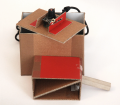mNo edit summary |
No edit summary |
||
| Line 4: | Line 4: | ||
Because of its simplicity it would be less susceptible to errors. | Because of its simplicity it would be less susceptible to errors. | ||
<br clear="all" /> | <br clear="all" /> | ||
== 3D Model == | |||
[[File:Animation.gif|200px|thumb|3D Model]] | |||
You can download the model here: [[Media:ModelWedges.zip]]. You need to have Google SketchUp installed to open the model. | |||
<br clear="all" /> | |||
== Preparing the Camera == | == Preparing the Camera == | ||
| Line 23: | Line 29: | ||
</gallery> | </gallery> | ||
== | == Copper Model == | ||
After checking and improving the functionality of the design with the cardboard construction the final model can be built. Here the base material for conductor boards is used. It is made out of epoxy with copper surface. This makes the material easy to work on. The smooth surface of the copper allows for a smooth movement of the wedges. | |||
The design was expanded by two small springs that constantly pull down the camera platform, preventing the platform to be pushed up by the firm cables of the camera. | |||
<gallery> | |||
File:buildingprocess01.jpg|conductor board material | |||
File:buildingprocess02.jpg|wedges | |||
File:buildingprocess03.jpg|copper model | |||
File:DIYLeiterplattenmodell01.jpg|copper model | |||
</gallery> | |||
Revision as of 15:07, 25 November 2012
Miroscopy Stage Construction
Approach with 2 wedges. The aim was to find a simple mechanism that allows for high precision. If you tighten the screw the lower wedge moves left and pushes up the upper wedge with the camera on top of it. If you loosen the screw the camera moves down.
Because of its simplicity it would be less susceptible to errors.
3D Model
You can download the model here: Media:ModelWedges.zip. You need to have Google SketchUp installed to open the model.
Preparing the Camera
First remove the lens of the camera. Use a screwdriver to unscrew the outer parts. Then use a hand saw or a pair of nippers to crack open the case around the cable. Carefully remove the plastic without damaging the cable. As a result you get the PCB with the cable and the LEDs. For now leave the black plastic ring on the PCB as a protection for the sensor.
The secound step is to remove the LEDs. Unsolder them carefully and clean the solder holes with a desoldering pump.
Cardboard Model
Copper Model
After checking and improving the functionality of the design with the cardboard construction the final model can be built. Here the base material for conductor boards is used. It is made out of epoxy with copper surface. This makes the material easy to work on. The smooth surface of the copper allows for a smooth movement of the wedges. The design was expanded by two small springs that constantly pull down the camera platform, preventing the platform to be pushed up by the firm cables of the camera.










